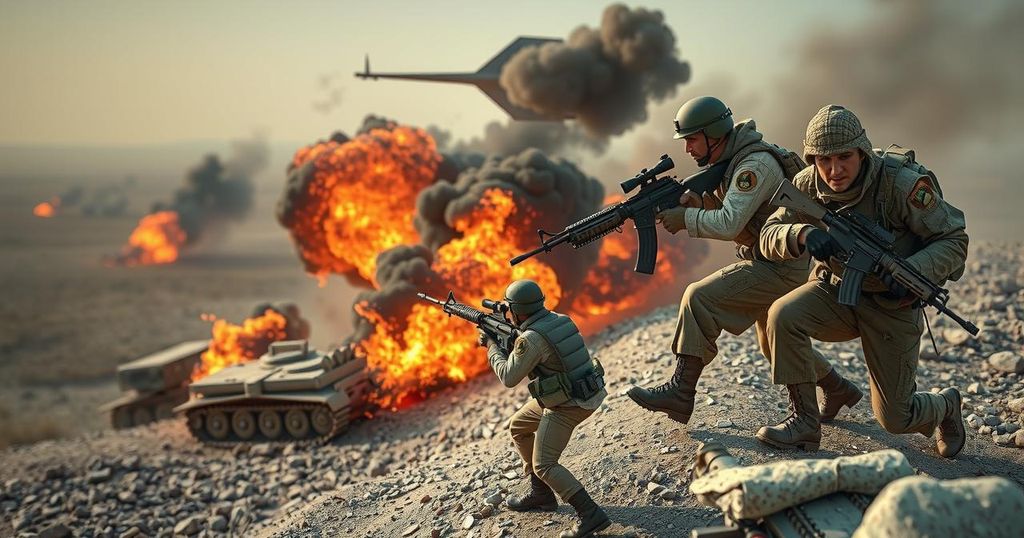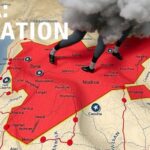Conflicts
AHMED AL - SHARAA, ANNALENA BAERBOCK, ASIA, BASHA, BASHAR AL - ASSAD, CONFLICT, DEIR EZZOR, EUROPE/ASIA, ISLAMIC STATE, JIHADIST GROUPS, KURDISH FORCES, MANBIJ, MILITARY OPERATIONS, SYRIA, SYRIAN DEMOCRATIC FORCES, SYRIAN OBSERVATORY FOR HUMAN RIGHTS, TAL RIFAAT, TURKEY, TURKISH DEFENCE MINISTRY, WAR
Clara Montgomery
Escalating Violence in Northern Syria: Over 100 Lives Lost in Clashes
A recent surge in hostilities between Turkish-backed forces and the SDF in northern Syria has led to over 100 deaths, including significant casualties on both sides. This ongoing conflict has raised international concerns about Kurdish security and the necessity for a ceasefire, emphasizing the importance of integrating Kurdish forces into Syria’s security structure for lasting peace.
In the past two days, fierce clashes between Turkish-backed factions and Syrian Kurdish forces have resulted in over 100 combatant deaths in northern Syria. Specifically, 101 fatalities were reported, including 85 from groups supported by Turkey and 16 from the Syrian Democratic Forces (SDF). According to the SDF, they successfully repelled attacks from what they described as “Turkey’s mercenaries,” which were reportedly supported by Turkish aerial operations. The Turkish defense ministry claimed to have “neutralised” 32 Kurdish fighters during these confrontations. The renewed hostilities in this region correlate with a series of offensives that began in late November against areas controlled by the Kurdish-led SDF. Despite US-led initiatives to broker a ceasefire in Manbij, Turkish-backed forces successfully seized control of this and the Tal Rifaat region in northern Aleppo, highlighting the ongoing and volatile nature of the conflict. German Foreign Minister Annalena Baerbock emphasized the need for Kurdish security as a prerequisite for lasting peace, advocating for an end to the violence and the integration of Kurdish factions into Syria’s broader security framework. The SDF maintains control over significant portions of northeastern Syria, having established a semi-autonomous government in response to the civil war which erupted in 2011. Turkish forces consistently target Kurdish fighters within Syria, linked to the PKK, a group recognized by Turkey as a terrorist organization. In a conversation with Al Arabiya TV, Ahmed al-Sharaa, the newly designated leader of Hayat Tahrir al-Sham (HTS), suggested that local Kurdish forces should become part of a unified national military.
The conflict between Turkish-backed groups and Kurdish forces, specifically the SDF, reflects the broader tensions in northern Syria, particularly in regions like Manbij where territorial disputes continue to spark violence. The SDF emerged as a significant force in the region during the Syrian Civil War, obtaining control and forming a semi-autonomous administration after government troops withdrew. The Turkish government’s perspective sees the SDF as closely allied with the PKK, a group engaged in a long-standing insurgency against the Turkish state. As a result, Turkish military operations against Kurdish forces are a consistent feature of the conflict in this area. Both local and international actors have expressed the importance of Kurdish security in achieving peace in Syria, a necessary condition that remains unfulfilled.
The recent escalation of violence in northern Syria highlights the precarious situation faced by Kurdish forces amid their continued conflict with Turkish-backed groups. With significant casualties reported and no signs of resolution, the need for diplomatic efforts becomes increasingly vital. The calls for a cohesive strategy regarding Kurdish security underscore the complexities of integrating diverse military factions into a unified national framework, aimed at achieving long-term stability in the region.
Original Source: www.iosconews.com








Post Comment